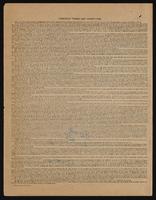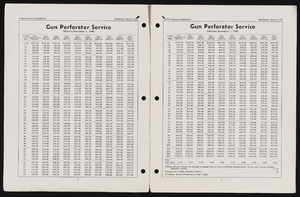Search the Special Collections and Archives Portal
Search Results
Richard Bryan oral history interviews
Identifier
Abstract
Oral history interviews with Richard Bryan conducted by Kristin Guthre on November 10, 2011 and an unknown date for the Boyer Early Las Vegas Oral History Project. Bryan begins by discussing his father’s time as a law student in Washington, D.C. and the influence his father had on his decision to pursue law. Bryan then chronicles moving to Las Vegas, Nevada in the 1940s and growing up in the Huntridge Community near Charleston Boulevard. Bryan recounts attending both the University of Nevada, Reno and the University of California, Hastings College of the Law in San Francisco, California. Bryan describes his experiences in the Las Vegas District Attorney’s office and the Army Reserve. He then recalls his political career as a member of the Nevada Senate, his role as the Attorney General of Nevada, the Governor of Nevada, and as a United States Senator. Lastly, Bryan discusses political issues in Nevada and the United States during his time in office such as debates about renewable energy, environmentalism, and preservation.
Archival Collection
Flora and Stuart Mason oral history interview
Identifier
Abstract
Oral history interview with Flora and Stuart Mason conducted by David G. Schwartz on February 27, 2010 for the Remembering Jay Sarno Oral History Project. Flora Mason begins by discussing the relationship between her family and the Sarnos. Mason describes that she and her husband socialized with Jay and Joyce Sarno in the 1960s because they lived on the same street in Las Vegas, Nevada. Stuart Mason recounts how the Sarnos were incredibly friendly and Jay occasionally invited him to play golf. Mason then chronicles his role as a contractor and the work he did for Jay Sarno throughout his career. He talks about how many of the development ventures of Sarno's were funded by Jimmy Hoffa and the Teamster’s Union. Lastly, Mason discusses how Sarno understood the gaming industry more than any other casino operator and how that was attributed to the success of Caesars Palace.
Archival Collection

Transcript of interview with Pauleen Foutz by Don Scott Kaye, February 25, 1980
Date
Archival Collection
Description
Text
Katherine A. Spilde Papers on Native American Gaming
Identifier
Abstract
The Katherine A. Spilde Papers on Native American Gaming include materials collected by anthropologist Katherine Spilde about Native American gaming and the greater gaming industry. The materials date from 1789 to 2015, with the bulk of materials dating from 1995 to 2010. Materials dating from the eighteenth and nineteenth centuries are reproductions of key court opinions and treaties concerning Native American rights and sovereignty. The majority of the materials document Native American gaming following the passage of the 1988 Indian Gaming Regulatory Act (IGRA). The papers detail Native American gaming enterprises both on and off reservations, the socioeconomic impact of gaming, and the legislative history of Native American gaming in the United States. The papers include research and subject files created by Dr. Spilde during her employment with the National Gambling Impact Study Commission (NGISC), the National Indian Gaming Association (NIGA), and the Harvard Project on American Indian Economic Development (HPAIED). The collection includes socioeconomic reports; testimonies; correspondence; memos; press releases; photographs; audiovisual materials; promotional materials from casinos and tourist attractions; brochures; fact sheets; summaries; booklets; pamphlets; advertisements; tourism materials; journal articles; legal briefs; legislative documents; court opinions; Dr. Spilde’s notes; presentations; packets, agenda, schedules, and itineraries from conferences; periodicals; Native American and community newspapers; and newspaper articles. The collection includes materials about over one hundred federally recognized Native American nations. Also included are materials that document the socioeconomic impact of gaming, the international gaming industry, criminal activities related to gaming, advertising about gaming and casinos, lotteries, internet gaming, compulsive gambling, and bankruptcy as a result of gambling.
Archival Collection
Nevada Consolidated Copper Company Records
Identifier
Abstract
The Nevada Consolidated Copper Company Records (approximately 1887-1978) contain the business records of the company, including correspondence, freight bills, ledgers, maps, leaching data, and books relating to mining. The majority of the records post-date the company's name change to Kennecott Mining Company.
Archival Collection
Charles P. and Delphine Squires Papers
Identifier
Abstract
The Charles P. and Delphine Squires Papers from 1882 to 1964, with bulk dates from 1905 to 1964, contain book and short story manuscripts, articles, press releases, newspaper clippings, and radio scripts written by Squires and his wife, all relating to their early life in Las Vegas. Also included are report cards, certificates, Parent Teacher Association material, Mesquite Club records and church activity materials.
Archival Collection
Blanch Jackson Photograph Collection
Identifier
Abstract
The Blanch Jackson Photograph Collection (approximately 1900-1941) contains black-and-white photographic prints and negatives from the Jackson family’s life in Tonopah, Nevada and their travels to mining sites in Nevada and Arizona. Blanch, her husband Clyde, her father-in-law Colonel David Howell Jackson, their two sons, and some acquaintances are pictured in the photographs.
Archival Collection
K. O. Knudson Photograph Collection
Identifier
Abstract
The K. O. Knudson Photographs (approximately 1920-1969) depict the Las Vegas Grammar School and service, fraternal, and veterans organizations gathered by retired Las Vegas, Nevada school administrator and World War I veteran K. O. Knudson (also known as K. Oscar Knudson). The collection includes images of Knudson, Las Vegas Masonic Lodge members, American Legion members, and school dances. The photographs primarily feature Las Vegas, Nevada.
Archival Collection


